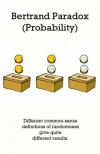- Joined
- Jan 4, 2016
- Messages
- 5,666
I have three boxes, one containing 2 gold coins, one containing 2 silver coins, and one containing 1 gold coin and 1 silver coin. I choose a random box, and a random coin from that box and pull out a gold coin. What is the chance that the other coin in the box is also gold?
Seems right... BUT WRONG
This is like when a 5 year old starts a joke out with the punch line to a different joke, has to start over, then forgets what joke they are telling, and ends up having to call an audible on a dumb knock knock joke. No one has any clue what just went down, the and the kid ain’t sure if you are laughing with them or at them.

